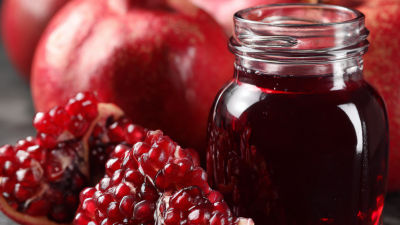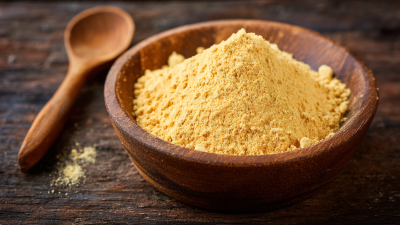How to Leverage Aminobutyric Acid Gaba for Enhanced Cognitive Performance
In recent years, the focus on cognitive enhancement has surged, driven by a growing awareness of the critical role mental performance plays in professional and personal success. Among various nootropics, Aminobutyric Acid Gaba has garnered significant attention for its potential benefits in promoting cognitive function, reducing anxiety, and improving overall mental clarity. According to a report by Grand View Research, the global cognitive enhancers market is expected to reach USD 6.4 billion by 2026, highlighting an increasing demand for supplements like Gaba that support brain health. This is particularly relevant in today’s fast-paced world, where the ability to think clearly and effectively is paramount. As research surrounding Aminobutyric Acid Gaba continues to evolve, it offers promising avenues for individuals seeking to optimize their cognitive performance and enhance their daily productivity.
Benefits of GABA for Cognitive Function Enhancement
GABA, or gamma-aminobutyric acid, is a naturally occurring neurotransmitter that plays a crucial role in regulating brain activity and enhancing cognitive function. As an inhibitory neurotransmitter, GABA helps to calm neuronal excitability, thereby reducing anxiety and stress. This calming effect is essential for maintaining focus and clarity in thought processes, making it a powerful ally for those seeking to improve their cognitive performance.
The benefits of GABA extend beyond mere tranquility; research suggests it may enhance memory retention and learning abilities. By promoting relaxation and reducing the overwhelming flood of information during high-pressure situations, GABA helps individuals process and store information more effectively. Furthermore, its role in improving sleep quality cannot be overlooked, as adequate rest is vital for cognitive function. By incorporating GABA into one’s routine, whether through supplements or GABA-rich foods, individuals can support their mental acuity and foster a more productive mindset.
Understanding the Science Behind Aminobutyric Acid
Aminobutyric Acid, commonly known as GABA (gamma-aminobutyric acid), plays a crucial role in the central nervous system as the main inhibitory neurotransmitter. Its primary function is to reduce neuronal excitability, which helps prevent overstimulation. GABA achieves this by binding to its receptors in the brain, leading to an influx of chloride ions into neurons, resulting in a calming effect. This mechanism is not only essential for maintaining balance in signals transmitted across synapses but also contributes significantly to cognitive performance.
Recent studies have highlighted the potential of GABA in enhancing mood, promoting relaxation, and improving focus. By mitigating anxiety and stress levels, GABA allows for clearer thinking and better decision-making processes. Furthermore, its role in enhancing sleep quality indirectly supports cognitive abilities, as restorative sleep is vital for memory consolidation and learning. Understanding the science behind GABA’s functionality opens avenues for utilizing this powerful compound in supplements aimed at boosting cognitive performance and overall mental well-being.
Practical Ways to Incorporate GABA into Your Daily Routine
Incorporating GABA (gamma-aminobutyric acid) into your daily routine can significantly enhance cognitive performance while promoting relaxation. One of the simplest and most effective ways to do this is to consume GABA-rich foods. Fermented products like yogurt, kimchi, and miso not only add valuable probiotics to your diet but also serve as natural sources of GABA. Incorporating these into meals can enhance brain function and reduce anxiety levels.
Another practical approach is to consider GABA supplements, which are widely available in health stores. Taking GABA supplements, especially during high-stress periods or before mentally demanding tasks, can bolster your focus and clarity. To optimize the benefits, pair supplementation with mindfulness practices such as meditation or deep-breathing exercises. This combination can amplify GABA's calming effects, allowing for improved concentration and cognitive efficiency throughout your day. Additionally, creating a sleep-friendly evening routine can help in maintaining optimal GABA levels, ensuring you wake up refreshed and ready to tackle the challenges ahead.
Safe Dosage Guidelines for Optimal Cognitive Performance
When leveraging aminobutyric acid (GABA) for enhanced cognitive performance, understanding safe dosage guidelines is crucial. Research indicates that the cognitive benefits of such supplements depend significantly on dosage. For instance, a systematic review on cognitive function enhancement in mild cognitive impairment revealed that specific dosage thresholds can amplify positive results. The nonlinear dose-response relationship observed emphasizes the importance of individualizing supplementation strategies for optimal outcomes.
Furthermore, a recent analysis highlighted that too little or too much of a cognitive enhancer could lead to diminished effects or increased side effects. In the context of exercise's impact on cognitive function, a targeted exercise dose of approximately 660 METs-min was identified as optimal for improved cognitive performance in Alzheimer's patients. This reinforces that optimal dosing—whether from GABA supplementation or physical activity—is essential in maximizing cognitive benefits. Therefore, adhering to established safe dosage guidelines can help individuals harness the cognitive-boosting power of GABA, ensuring both safety and efficacy.
Impact of Aminobutyric Acid (GABA) Dosage on Cognitive Performance
Potential Side Effects and Considerations When Using GABA
When considering the use of aminobutyric acid (GABA) for cognitive performance enhancement, it is crucial to be aware of potential side effects and important considerations. Research indicates that while GABA supplementation may support relaxation and potentially improve focus, it is essential to recognize that the efficacy of GABA crossing the blood-brain barrier remains a point of contention in the scientific community. A study published in the "Journal of Neuroscience" suggests that although GABA plays a vital role in neurotransmission, the actual cognitive benefits from supplementation may vary widely among individuals.
Moreover, GABA supplementation can lead to side effects, including sedation, gastrointestinal discomfort, and interactions with other medications. According to a report from the American Academy of Neurology, users may experience drowsiness or fatigue, particularly if taken in high doses or alongside other sedatives. Therefore, it is advisable to start with lower doses and monitor individual responses carefully. Individuals with certain medical conditions, particularly those affecting the liver or those taking anti-anxiety medications, should consult a healthcare professional before incorporating GABA into their regimen to avoid adverse reactions. Understanding these considerations is crucial for anyone looking to leverage GABA for its potential cognitive benefits.
| Aspect |
Details |
| What is GABA? |
Gamma-aminobutyric acid (GABA) is a neurotransmitter in the brain that inhibits nerve transmission, promoting relaxation and reducing anxiety. |
| Cognitive Benefits |
May enhance mood, improve focus and memory, and decrease stress levels, contributing to better cognitive performance. |
| Recommended Dosage |
Typical oral doses range from 500 mg to 2000 mg per day, taken in divided doses. |
| Possible Side Effects |
Drowsiness, dizziness, gastrointestinal issues, and potential interactions with other medications. |
| Considerations |
Consult with a healthcare professional before starting supplementation, especially for pregnant or nursing women, or individuals with underlying health conditions. |
| Forms of GABA |
Available in various forms including capsules, powders, and topical creams. |
| Natural Sources |
Found in fermented foods, teas, and certain whole foods, as well as in supplements. |

About Us
Products
Nutraceuticals
Botanical Extracts
Berberis Extract
Ginkgo Biloba Extract
Rutin
Quercetin
Grape Seed Extract
European Bilberry Extract
Broccoli Seed Extract
Fisetin
Ajuga Extract
Resveratrol
Stevia Leaf Extract
Green Tea Extract
Olive Leaf Extract
Epimedium Extract
Rhodiola Rosea Extract
Panax Ginseng Extract
Pomegranate Extract
Garlic Extract
Milk Thistle Extract
Black Pepper Extract
Fruit & Vegetable Juice Powder
Customized Service
News
Blog
Contact Us






